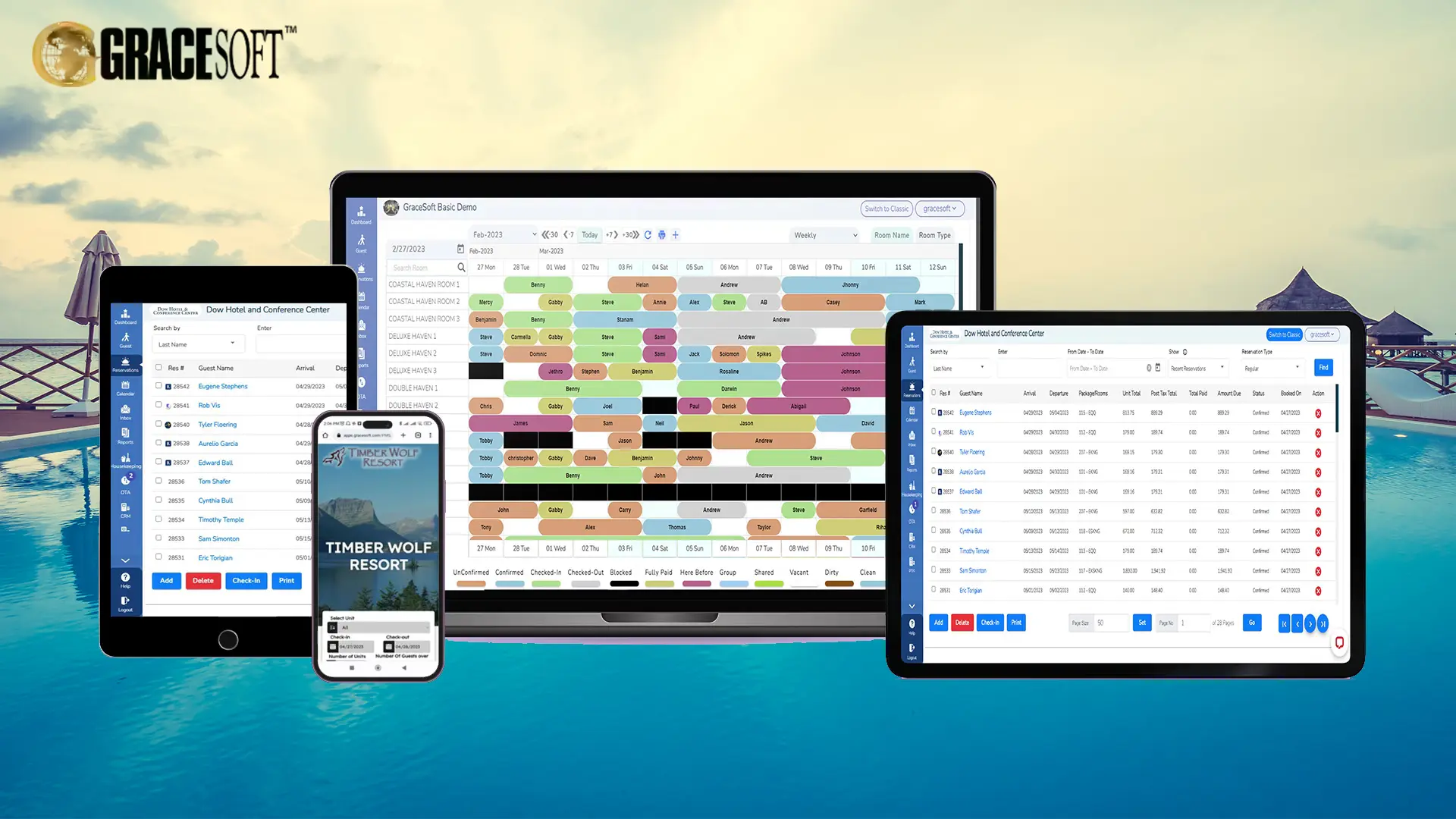Benefits of Cloud-Based Hotel Software & Hotel Management System for Hotel Owners
Benefits of Cloud-Based Hotel Software & Hotel Management System for Hotel Owners
Using cloud-based hotel software and a hotel management system (HMS) provides numerous benefits for hotel owners, managers, and staff, allowing them to streamline operations, improve guest experiences, and increase profitability.
Remote Access & Flexibility: Manage Your Hotel From Anywhere
Cloud-based systems can be accessed from anywhere with an internet connection, making it easier for hotel staff and management to operate, monitor, and manage the property remotely. Whether at the front desk, in a meeting, or working from home, the system is always available.
Managers can quickly check occupancy rates, room availability, or financial reports from any device (laptop, smartphone, tablet), allowing for quicker decision-making and more flexible operations.
Cost-Efficiency & Lower IT Overhead with Cloud Solutions
Cloud-based hotel software to Cloud-based hotel Management software often reduces the need for expensive on-site infrastructure, such as servers or IT personnel for maintenance. Since the software is hosted in the cloud, the responsibility for updates, security, and system uptime falls to the software provider.
It typically operates on a subscription model, so you can avoid large upfront costs and scale your usage according to the hotel's needs.
Real-Time Data & Analytics for Smarter Hotel Operations
Cloud-based systems provide real-time data, allowing hotel managers to quickly access current occupancy, revenue, booking trends, and guest preferences. This helps in making immediate adjustments to pricing, promotions, or staffing to improve efficiency and profitability.
Analytics tools can give valuable insights into operational performance, helping identify areas for improvement and track progress over time.
Collaboration & Unified Platform for All Hotel Departments
Since cloud-based systems are accessible by multiple users at the same time, team members from different departments (reception, housekeeping, sales, etc.) can collaborate seamlessly. Information is updated in real time, which ensures everyone is on the same page, reducing communication errors.
For larger hotel chains, it’s easy to manage multiple properties from a single interface.
Scalability, Security & Integrations: Growing Your Hotel Business
Hotel management systems centralise many key functions such as reservations, guest check-ins and check-outs, billing, housekeeping schedules, and inventory management into one platform. This reduces the need for multiple systems and helps hotel staff work more efficiently.
Integrations with other services (payment gateways, booking engines, etc.) ensure that all operations are connected and automated.
How to Choose the Right Cloud Hotel Management System
A well-designed hotel management system allows staff to access guest profiles, preferences, and history, enabling them to offer personalized services. For example, knowing a guest prefers a particular room type or extra amenities helps improve their overall experience.
Some cloud systems allow guests to make reservations, check in/out, or request services via mobile apps, making the process more convenient and contactless, which is especially important in the post-pandemic era. Automatic Updates and Maintenance
Cloud-based systems receive regular updates automatically, meaning hotels always have access to the latest features, bug fixes, and security patches without needing manual intervention. This reduces the risk of system downtime and ensures the hotel is using up-to-date software.
Maintenance is handled by the software provider, meaning hotels don’t need to worry about hiring IT staff to handle server issues or software upgrades.
Scalability
As a hotel grows or has fluctuations in demand (e.g., seasonal peaks), cloud-based systems can easily scale to accommodate the needs of the business. This could mean adding more rooms, expanding services, or integrating new features without the need to purchase additional hardware or software.
This flexibility makes cloud-based hotel management systems suitable for a wide range of properties, from small boutique hotels to large international chains.
Better Security
Cloud service providers typically offer advanced security features, including data encryption, secure access protocols, and regular backups, which can be difficult and costly to implement on-site. This ensures that sensitive guest information (like payment details) is protected and complies with data protection regulations (like GDPR, PCI-DSS).
Many cloud systems also offer multi-level access controls, allowing management to restrict access based on the user's role.
Integration with Third-Party Services
Hotel management systems often integrate seamlessly with third-party applications such as online booking platforms (Booking.com, Expedia), payment processors, channel managers, CRM tools, and more. This streamlines operations and ensures real-time updates across all platforms.
This integration helps maximize room bookings and ensure consistent pricing across channels, which can directly lead to increased revenue.
Enhanced Marketing Capabilities
Cloud-based systems often include marketing features, such as email campaigns, promotions, pricing management, and guest loyalty programs. These tools help hotels engage with customers, increase repeat bookings, and improve their online presence.
You can also track guest preferences and behavior to offer targeted promotions and upsell services effectively.
Environmental Benefits
With fewer physical resources (paper, servers, etc.) required, cloud-based systems can reduce a hotel's carbon footprint. Additionally, the increased efficiency of operations can lead to better resource management and energy savings (e.g., optimizing room turnover or housekeeping schedules).
You May Also Like
These Related Stories
.jpg)
Most Popular Hotel Management Software for Small Hotels | GraceSoft
%20(1).jpg)
5 Best Hotel Management Software Solutions | GraceSoft


No Comments Yet
Let us know what you think